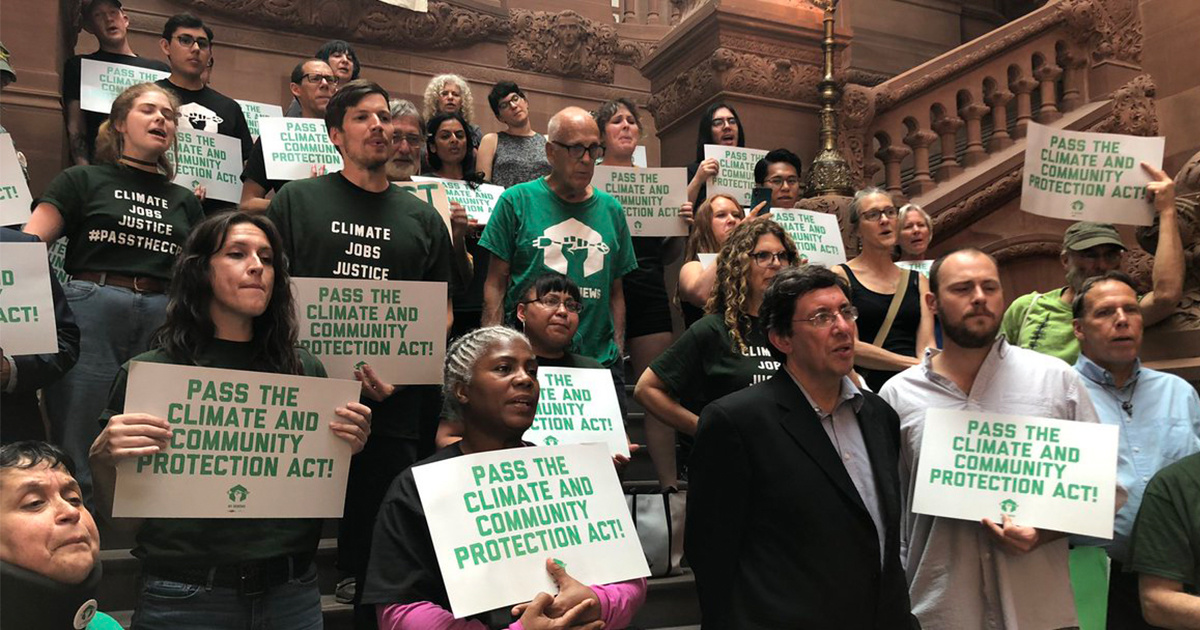
‘Huge Victory’ for Grassroots Climate Campaigners as NY Lawmakers Reach Deal on Sweeping Climate Legislation

Members of the NY Renews coalition gathered before New York lawmakers reached a deal on the Climate and Communities Protection Act. NYRenews / Twitter
By Julia Conley
Grassroots climate campaigners in New York applauded on Monday after state lawmakers reached a deal on sweeping climate legislation, paving the way for the passage of what could be some of the country’s most ambitious environmental reforms.
The legislature reached an agreement just before midnight Sunday on the Climate and Communities Protection Act (CCPA), one of several climate bills state lawmakers have pushed in recent months since progressives gained momentum in their push for a federal Green New Deal.
New York’s CCPA — like those passed in recent months in California, Hawaii, New Mexico, Nevada and Washington — offers a path forward for the implementation of Green New Deal-like laws at the state level, proponents say.
“This is going to be a huge victory for the environmental justice movement in New York,” author Naomi Klein tweeted, adding that some far-reaching parts of President Franklin Roosevelt’s New Deal grew out of state legislation.
New York’s CCPA calls for zero fossil fuel emissions from utilities by 2040. By 2050, 85 percent of all energy in the state will be from renewable sources under the legislation, with the remaining 15 percent being off-set or captured.
“By and large, this is a very big victory,” Arielle Swernoff of New York Renews, a coalition that pushed to pass the bill, told the Huffington Post. The group counts more than 100 groups in its membership, including national groups like 350.org and Friends of the Earth as well as local organizations like Saratoga Unites and Syracuse United Neighbors.
The bill emphasizes the climate crisis’s impact on low-income and marginalized communities, mandating that 35 percent of energy funding be directed to such towns and cities.
“By passing the CCPA with all its equity provisions intact, New York State can both address the climate crisis and build a more equitable economy,” Assemblywoman Latrice Walker wrote at City Limits.
“Help is on the way,” tweeted state Sen. Todd Kaminsky, who sponsored the legislation. “While D.C. sleeps through a crisis, New York steps up.”
Members of New York Renews gathered on Monday in Albany, where lawmakers are expected to pass the legislation on Wednesday.
“We believe that we will win!” the group chanted.
Peter Iwanowicz, executive director of Environmental Advocates of New York, gave credit to grassroots organizers for pressuring their state representatives to reach a deal on and pass the CCPA.
“Thank you to the frontlines for bringing this into Albany,” Iwanowicz told the group gathered in the state capital. “Insiders couldn’t do this by ourselves.”
Beyond the benefits the CCPA has in store for New Yorkers, one climate campaigner wrote on social media, the expected passage of the bill after pressure from the NY Renews coalition bodes well for a potential federal Green New Deal in the future.
“What a massive win for the climate justice movement and the frontline communities that have fought so hard for this!” wrote Daniel Aldana Cohen, a professor at University of Pennsylvania. “If flipping a bunch of New York State senate seats and building fighting coalitions could achieve all this in a couple years — just imagine what millions of organized people in the streets and a federal Green New Deal could do.”
Reposted with permission from our media associate Common Dreams.

 233k
233k  41k
41k  Subscribe
Subscribe 